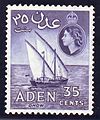Yemen Portal


Yemen, officially the Republic of Yemen, is a country in West Asia. Located in southern Arabia, it borders Saudi Arabia to the north, Oman to the northeast, the Red Sea to the west, the Gulf of Aden to the south, and the southeasten part of the Arabian sea to the east, sharing maritime borders with Eritrea, Djibouti and Somalia across the Horn of Africa. Covering roughly 455,000 square kilometres (176,000 square miles), with a coastline of approximately 2,000 kilometres (1,200 miles), Yemen is the second largest country on the Arabian Peninsula. Sanaa is its constitutional capital and largest city. Yemen's estimated population is 34.7 million, mostly Arab Muslims. It is a member of the Arab League, the United Nations, the Non-Aligned Movement and the Organisation of Islamic Cooperation.
Owing to its geographic location, Yemen has been at the crossroads of many civilisations for over 7,000 years. In 1200 BCE, the Sabaeans formed a thriving commercial kingdom that included parts of modern Ethiopia and Eritrea. In 275 CE, it was succeeded by the Himyarite Kingdom, which spanned much of Yemen's present-day territory and was heavily influenced by Judaism. Christianity arrived in the fourth century, followed by the rapid spread of Islam in the seventh century. Yemenite troops played a crucial role in early Islamic conquests. Various dynasties emerged between the 9th and 16th centuries. During the 19th century, the country was divided between the Ottoman and British empires. After World War I, the Kingdom of Yemen was established, which in 1962 became the Yemen Arab Republic (North Yemen) following a coup. In 1967, the British Aden Protectorate became the independent People's Democratic Republic of Yemen (South Yemen), the first and only officially socialist state in the Arab world. In 1990, the two Yemeni states united to form the modern Republic of Yemen, with Ali Abdullah Saleh serving as the first president until his resignation in 2012 in the wake of the Arab Spring.
Since 2011, Yemen has been enduring a political crisis, marked by street protests against poverty, unemployment, corruption, and President Saleh's plan to amend Yemen's constitution and eliminate the presidential term limit. By 2015, the country became engulfed by an ongoing civil war with multiple entities vying for governance, including the Presidential Leadership Council of the internationally recognized government, and the Houthi movement's Supreme Political Council. This conflict, which has escalated to involve various foreign powers, has led to a severe humanitarian crisis. (Full article...)
Selected article -

The Bab-el-Mandeb (Arabic: باب المندب, lit. 'Gate of Lamentation', Tigrinya: ባብ ኣል ማንዳብ), the Gate of Grief or the Gate of Tears, is a strait between Yemen on the Arabian Peninsula and Djibouti and Eritrea in the Horn of Africa. It connects the Red Sea to the Gulf of Aden and by extension the Indian Ocean. (Full article...)
List of selected articles
|
|---|
Selected biography -
Ali Abdullah Saleh Affash (21 March 1947 – 4 December 2017) was a Yemeni military officer and politician who served as the first president of the Republic of Yemen from the Yemeni unification in 1990 until his resignation in 2012, following the Yemeni revolution. Previously, he had served as the fourth and last President of the Yemen Arab Republic (North Yemen), from July 1978 to 22 May 1990, after the assassination of President Ahmad al-Ghashmi. al-Ghashmi had earlier appointed Saleh as military governor in Taiz.
Saleh developed deeper ties with Western powers, especially the United States, during the War on Terror. Islamic terrorism may have been used and encouraged by Ali Abdullah Saleh in order to win Western support and for disruptive politically motivated attacks. In 2011, in the wake of the Arab Spring, which spread across North Africa and the Middle East (including Yemen), Saleh's time in office became increasingly precarious, until he was eventually ousted as President in 2012. He was succeeded by Abdrabbuh Mansur Hadi, who had been serving as vice president since 1994, and acting president since 2011. (Full article...)
List of selected biographies
|
|---|
General images -
Selected city -
Ibb (Arabic: إِبّ, romanized: ʾIbb) is a city in Yemen, the capital of Ibb Governorate, located about 117 km (73 mi) northeast of Mocha and 194 km (121 mi) south of Sana'a. A market town and administrative centre developed during the Ottoman Empire, it is one of the most important medium-sized cities in the country. It is situated on a mountain ridge, surrounded by fertile land. As of 2023, it has an estimated population of 771,500 residents. Other names for Ibb, is "The Land of Green" (Full article...)
Selected picture -
Selected cuisines, dishes and foods -
Fatteh (Arabic: فتّة meaning crushed or crumbs, also romanized as fette, fetté, fatta or fattah) is an Egyptian and Levantine dish consisting of pieces of fresh, toasted, grilled, or fried flatbread covered with other ingredients that vary according to region. It is also some times referred to as shâmiyât (Arabic: شاميات "Damascene") in the Levant area. (Full article...)
List of articles
|
|---|
Related portals
Religions in Yemen
Arab states
Related portals
Categories
Topics
Related portals
Religions in Yemen
Arab states
Related portals
Associated Wikimedia
The following Wikimedia Foundation sister projects provide more on this subject:
-
Commons
Free media repository -
Wikibooks
Free textbooks and manuals -
Wikidata
Free knowledge base -
Wikinews
Free-content news -
Wikiquote
Collection of quotations -
Wikisource
Free-content library -
Wikiversity
Free learning tools -
Wiktionary
Dictionary and thesaurus
More portals









































































